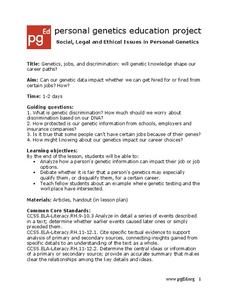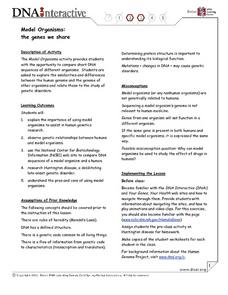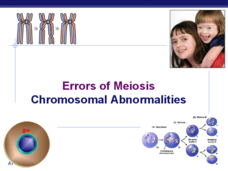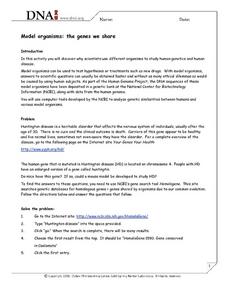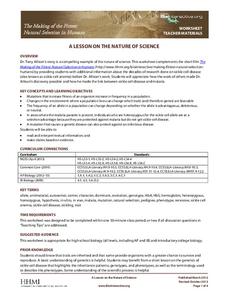National Academy of Sciences
Genetic Disease: Putting DNA to Work
Scientific knowledge of genetic information has grown quickly over the last decade. An interactive lesson has learners research the role of science and medicine in diagnosing and treating genetic disorders. They consider the job of the...
Personal Genetics Education Project
Genetics, Jobs and Your Rights
Your class will read an overview of the Genetic Information Nondiscrimination Act, passed in 2008 and address the question of whether or not genetic information should be used to influence our career paths. In jigsaw style, they then are...
Personal Genetics Education Project
Protecting Athletes with Genetic Conditions: Sickle Cell Trait
Should school and professional teams test athletes for sickle cell trait? Will it protect them by providing knowledge or lead to discrimination by not allowing them to participate in sports? After learning about this genetic disorder,...
Virginia Department of Education
Building a DNA Model
It has been decades since the discovery of DNA. Still, activities such building this DNA model allow blossoming scientists to better understand the components that form this overall structure. During this activity, they will also...
Curated OER
Genetics/Blood Types Crossword
In this genetics worksheet, students complete a crossword puzzle given thirty six clues about genetic disorders, genetic inheritance and blood types.
Curated OER
Human Genetic Diseases
Although there are a few missing titles in this collection of slides, if your class has the support of a genetic disease lecture to accompany it, this resource will be very useful. The mechanism of genetic inheritance is covered. Flow...
Virginia Department of Education
Meiosis
Intrigue the class by completing a instructional activity on meiosis, filled with challenging and insightful activities to spark the interest of every person in the room. Each member of the class learns about genetic disorders due to...
Curated OER
Your Body, Your Health
Young scholars study sickle cell anemia and other genetic disorders. In this investigative lesson students create a poster and present it to the class on a certain disorder.
North Carolina State University
Exploring Genetics Across the Middle School Science and Math Curricula
Where is a geneticist's favorite place to swim? A gene pool. Young geneticists complete hands-on activities, experiments, and real-world problem solving throughout the unit. With extra focus on dominant and recessive genes, Punnett...
Virginia Department of Education
Passing Traits to Offspring
What makes each one of us unique? Lead your class in this exciting and educational activity as you uncover traits that show how each individual is different from another. Pupils explore facts about DNA technology and predict the...
Curated OER
Are You Susceptible?
Students play a game to explore the relationship between genetic variation and environmental factors in the onset of heart disease. They consider the implications for disease prevention of increased knowledge about genetic variation.
Centers for Disease Control and Prevention
Diabetes in the Family: A Case Study
Students examine a case study of a woman with a family history of type 2 diabetes and create a "family health portrait" that assesses her risk of developing diabetes. They use the family health portrait to record the woman's family...
Curated OER
Mendelian Inheritance of Human Traits
In this Mendelian inheritance learning exercise, students will use a pedigree to complete 4 short answer questions about recessive and dominant traits. Then students will create a Punnett square. Finally, students will match 5 genetic...
Curated OER
Inside Story: Your Body, Your Health
Learners research about different genetic disorders. In this biology lesson, students create a poster highlighting facts about the disorder. They present their findings in class.
Curated OER
What is the purpose of Karyotyping?
Students explain how karyotyping is used to diagnose specific genetic disorders. They use karyotypes to make observations and analyze chromosomal errors. This activity can be completed online or without computer access.
Curated OER
Model Organisms: The Genes We Share
Students gather information about gene banks. For this biology lesson, students work in groups to complete an activity sheet about genetic databases and organism genomes. Lesson includes extension ideas.
Curated OER
Identifying Disease Genes using BLAST
Students navigate the National Center for Biological Information (NCBI) website and BLAST program to conduct a variety of biological assignments.
Curated OER
Errors of Meiosis: Chromosomal Abnormalities
After viewing these concise summaries of the common chromosome abnormalities that cause disorders, students' understanding of genetic errors will be much better. This presentation has clear diagrams to accompany the explanations....
Curated OER
Genome: The Secret of How Life Works
What do you have in common with a fruit fly? About 60 percent of your DNA. The resource, divided into two units, is intended for grades four to eight and another for high schoolers. Both units include eight lessons covering the...
Curated OER
Model Organisms: The Genes We Share
In this genetics worksheet, students access a website to learn about how human genes mutate to cause heritable disorders such as Huntington disease. Students use the information on this website to complete 12 short answer questions.
Curated OER
Background of Diseases-- Germs or Genes?
Students explore the background of common diseases. For this personal health lesson, students research causative agents of communicable and non-communicable diseases. Students use their research findings to create data tables in...
Howard Hughes Medical Institute
A Lesson on the Nature of Science
If you are looking for a great way to present natural selection in humans, look no further. This handout is intended to accompany the 14-minute video The Making of the Fittest: Natural Selection in Humans, which can be found on the...
Curated OER
The Effects of Alcohol and other Teratogens: A model using Zebrafish
Students investigate the interference of various drugs on an embryo through experimentation. This is an open-ended lab to allow students to see effects of various chemicals humans choose to put in their bodies and create questions they...
University of Utah
University of Utah: Genetic Science Learning Center: Examples of Aneuploidy
Only a few types of aneuploidy are compatible with life. Use this drop-down menu to understand more about common genetic disorders resulting from monoploidy and polyploidy, such as Down Syndrome. Learn features of the disorder, see how...



